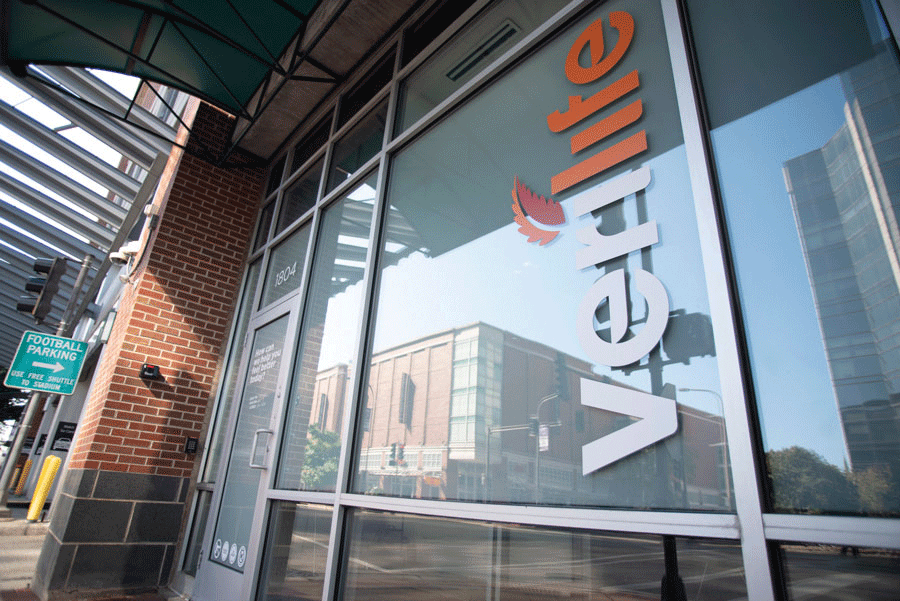As legal cannabis goes into effect, proponents of medical cannabis, social equity have concerns
Daily file photo by Colin Boyle
Verilife Medical Marijuana Dispensary on 1804 Maple Ave. The dispensary has now been replaced by MedMen dispensary, at the same location.
January 6, 2020
On paper, Jose Gonzalez seems unlikely to be hesitant about legalizing recreational cannabis in Illinois.
As executive director of Educated Alternative — an Oak Lawn-based nonprofit that provides assistance to people seeking medical cannabis — Gonzalez has no problem with the drug. He’s used it for most of his life. But with anticipated cannabis shortages and local regulations not yet entirely decided, Gonzalez said he’s concerned the sudden uptick in recreational use will leave patients in Illinois’ existing medical cannabis program behind.
“We’re putting a lot of importance on the recreational program, which doesn’t serve the patients of Illinois well,” Gonzalez said. “The state put way too fast a deadline on sales, not allowing cultivation facilities and dispensaries to properly ramp up.”
Following statewide legalization of recreational cannabis use for adults ages 21 and up, the Evanston City Council voted in September to permit the sale of recreational cannabis within city limits. Illinois residents of age can now legally purchase up to 30 grams of cannabis, after the law went into effect Jan. 1. But for Gonzalez and others, legalization has raised concerns that rushed implementation may leave residents and businesses unprepared.
New taxes to come with cannabis
MedMen, located where Verilife dispensary used to be at 1804 Maple Ave., saw a crowd that police estimated reached 400 on Jan. 1, according to the Chicago Tribune. Recreational cannabis products, however, could be taxed as high as 34.75 percent, while medical cannabis products will only get taxed one percent.
Gonzalez said he expects an influx of people seeking medical cannabis cards to take advantage of lower taxes and prioritized access.
“There will be a new flow of people frustrated with the recreational portion,” Gonzalez said. “When lack of product is there, the lion’s share of what is sold is going to have to go to medical patients.”
Even after May 2020 — when stores besides former medical dispensaries will be granted licenses — high barriers to entry may prevent new players from entering the industry. The license application fee alone costs $5000. Neither Qi Kratom CBD Tea nor Walsh Natural Health, which currently sell CBD in downtown Evanston, plan on applying for a license.
“It’s really all about money,” Qi Kratom CBD Tea employee Addie Palaganas said. “Whoever has the money gets the license.”
Social equity or broken promises?
Unlike most Illinois residents, public housing tenants won’t be allowed to smoke cannabis in their homes come 2020. Since federal law still considers both medical and recreational cannabis illegal — and public housing is federally subsidized — residents caught with cannabis could be evicted.
“We’re not going to be actively enforcing it, but there is a lane for eviction if a tenant is found using an illegal substance,” communications director for the Housing Authority of Cook County Nick Mathiowdis said. “The onus is on Congress and the federal government. It’s really out of our hands at this point.”
Despite lack of control over federally subsidized areas, local lawmakers have passed several “social equity” provisions in an effort to aid communities disproportionately impacted by the war on drugs. These include using tax revenue from Evanston’s cannabis sales to fund $10 million in local reparations, expunging cannabis offenses from an estimated 770,000 Illinois residents’ criminal records and giving preference to what the city calls “social equity applicants” in granting licenses to sell cannabis.
Yet many are concerned about equitable implementation. Zero out of 11 existing medical cannabis dispensaries are African American, Black Caucus chairman Ald. Jason Ervin (28th) said in a Chicago City Council meeting.
Even when more licenses are awarded, it’s unclear how many will be reserved for social equity applicants. When Massachusetts voted to legalize recreational cannabis in 2016, lawmakers passed similar equity provisions to Illinois’. Yet only two of 184 license-holders in Massachusetts are in the state’s social equity program.
Seke Ballard, the CEO of cannabis company loan provider Good Tree Capital, said he fears Illinois is moving in the same direction. He’s committed to investing up to $250,000 to front application costs for 100 social equity candidates.
“For me it represents a double bottom line,” Ballard said. “It’s making money and feeling good about it at the same time.”
Will Evanston be Evanstoned?
McCormick freshman Griffin Berse can’t wait until his 21st birthday, but not because he’ll be able to legally drink alcohol. He’s more excited at the prospect of legally purchasing cannabis.
“I think weed is a way cooler experience than drinking,” Berse said. “You don’t get the negative effects the next morning.”
But while much of Evanston’s younger population is excited for legalization, others — especially older residents — are apprehensive.
Evanston resident Margaret Schott, 63, is opposed to legalization. She’s concerned it will lead to more people driving while high and an increase in drug abuse.
“Mood altering is overrated,” Schott said. “People are looking to escape, but there are other ways.”
Others are concerned about the message that lines around the block at the local dispensary could send. Gonzalez worries the dispensary’s visibility could increase the stigma around medical cannabis.
“When you’re passing a dispensary, people are going to shake their heads and say, ‘Look at all these people waiting outside this dispensary to get drugs,’” Gonzalez said. “It’s the job of organizations like ours to make sure people understand the difference between what they were taught 50 years ago and the reality of today.”
Email: [email protected]
Twitter: @hannah_feuer












